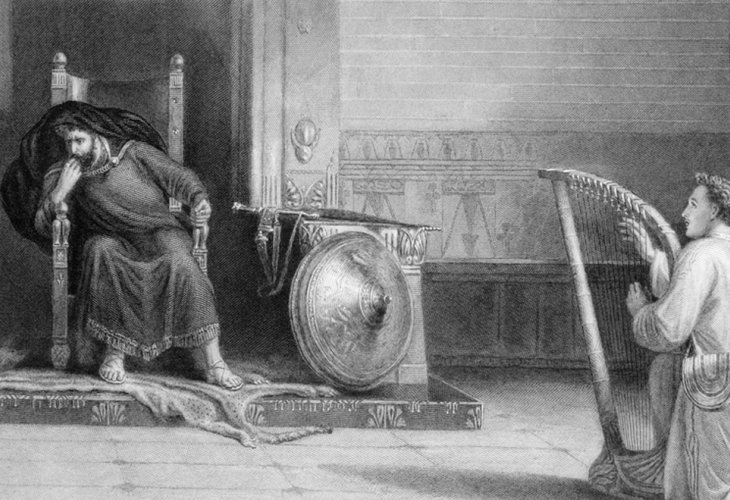Torah Personalities
The Rise and Fall of King Shaul
From humility to heartbreak: the life of Israel’s first king and his enduring legacy
 (Photo: Shutterstock)
(Photo: Shutterstock)King Shaul was the first monarch of Israel, a man of great promise whose reign ended in tragedy. His story is one of courage, humility, missteps, and missed opportunities. Though chosen by Hashem and anointed by the prophet Shmuel, Shaul's failure to fully obey Divine command cost him the crown and changed the course of Jewish history.
An Unlikely King with a Noble Mission
Shaul came from the tribe of Binyamin, not Yehudah, the tribe destined for kingship. Yet his appointment had a spiritual logic. At the time of Yaakov's encounter with Esav, all of Yaakov's sons bowed to Esav, except Binyamin, who had not yet been born. Because Binyamin had no part in that act of submission, a king from his lineage was chosen to lead the battle against Amalek, descendants of Esav.
Shmuel the prophet delivered Hashem’s command to Shaul: destroy Amalek completely, leaving no survivors, not even animals. The Torah records this harsh directive: "Now go and strike Amalek, and utterly destroy all that he has. Do not spare him, but kill man and woman, child and infant, ox and sheep, camel and donkey” (Shmuel I 15:3).
However, Shaul disobeyed. He spared Agag, the king of Amalek, and preserved the Amalekite livestock. Some sources explain that many Amalekites survived by disguising themselves as animals using sorcery. Because Shaul failed to carry out the command, Shmuel informed him that Hashem had rejected him as king and would give the monarchy to someone more worthy.
A Troubled Spirit and a Young Musician
After Shaul’s failure, Shmuel anointed David as the next king. At that moment, the spirit of Hashem departed from Shaul, and a “ruach ra’ah” (evil spirit) descended upon him. As the Tanach says:
"And the spirit of Hashem departed from Shaul, and an evil spirit from Hashem terrified him" (Shmuel I 16:14).
The Yalkut Me’am Loez explains that this "evil spirit" was a form of melancholia or spiritual depression. Shaul’s advisors suggested music as therapy and recommended David, known for his musical talent. David played for Shaul, and his music soothed the king’s troubled spirit. Shaul grew fond of David, at first, for both his abilities and his noble character.
David, Michal, and a Father's Betrayal
After David’s dramatic defeat of Goliat, the people praised him: “Shaul has slain his thousands, and David his tens of thousands” (Shmuel I 18:7). This provoked Shaul’s jealousy. Hoping David would fall in battle, Shaul offered him his daughter Merav in marriage, but David declined. Shaul then offered his other daughter, Michal, whom David did marry.
Later, when Shaul plotted to kill David, it was Michal who saved her husband. She helped David escape through a window, choosing loyalty to her husband over her father.
Shaul’s Humility and the Cost of Hesitation
Despite his failures, Shaul’s humility was remarkable. When first approached by Shmuel to be anointed king, Shaul responded: “Am I not from Binyamin, the smallest tribe of Israel? Why would you speak to me this way?” (Shmuel I 9:21).
Even after being publicly declared king, some people mocked him. Yet Shaul remained silent: “But some scoundrels said, ‘How can this man save us?’ They despised him and brought him no gift, but he kept silent” (Shmuel I 10:27).
His modesty, however, could also be a weakness. His failure to act decisively, whether in sparing Agag or in waiting for Shmuel, revealed a reluctance to fully assert his authority when it mattered most.
The Final Battle and Shaul’s Death
Shaul ultimately died in battle against the Philistines, along with his sons, including Yonatan. According to rabbinic sources (Tanchuma Emor 4; Vayikra Rabbah 26:7), Shaul died for five transgressions, though he repented for them all:
He destroyed the city of Nov, home of the kohanim (priests)
He spared Agag, king of Amalek
He failed to wait for Shmuel at Gilgal
He consulted with a necromancer
He did not fully seek Hashem’s guidance
Before the final battle, Shmuel (who had already passed away) appeared to Shaul and foretold his defeat and death.
King Shaul began his journey with great potential, chosen by Hashem and beloved by the people. But his inability to fully obey Divine instruction, combined with personal insecurity, cost him the crown. His story is a sobering reminder that even great leaders must balance humility with strength and that faithfulness to Hashem must always come first.

